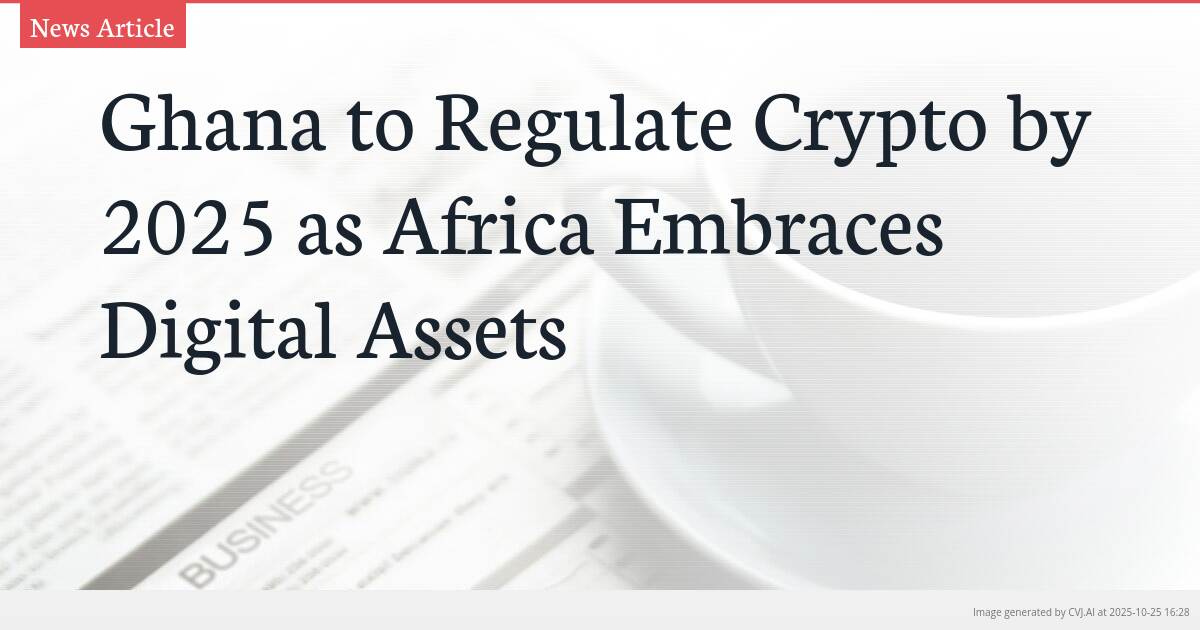This summary text is fully AI-generated and may therefore contain errors or be incomplete.
Introduction
Ghana is joining Africa’s crypto regulatory race with plans to implement comprehensive digital asset laws by 2025. The Bank of Ghana’s announcement follows draft guidelines published last year and positions the country among a growing number of African nations establishing legal frameworks for cryptocurrency. This move aims to balance industry growth with consumer protection in one of the world’s fastest-growing crypto regions.
Key Points
- Ghana will join nine other African countries that have already established legal frameworks for digital assets and cryptocurrency operations
- Sub-Saharan Africa ranks as the third-fastest-growing region globally for cryptocurrency adoption, driven primarily by grassroots and retail participation
- The Bank of Ghana published initial draft guidelines for cryptocurrency regulation last year, providing the foundation for the upcoming 2025 implementation
Ghana's Regulatory Timeline and Framework Development
The Bank of Ghana has confirmed that comprehensive cryptocurrency regulations will be in place by the end of 2025, according to the central bank governor’s recent announcement. This regulatory framework builds upon draft guidelines the bank published last year, representing a significant step forward in creating a structured environment for digital assets in the country. The timeline provides crypto investors and companies with clarity about when they can expect formal legal recognition and operational guidelines.
The development of these regulations follows a careful balancing act between creating favorable conditions for the crypto industry and addressing consumer safety concerns. By establishing a strong legal footing, Ghana aims to attract legitimate crypto businesses while protecting consumers from potential risks associated with digital asset transactions. The Bank of Ghana’s approach reflects a measured strategy of building regulatory capacity while allowing the industry to develop within defined parameters.
The forthcoming regulations will position Ghana as the tenth African nation with established digital asset laws, joining a growing continental movement toward formal crypto recognition. The Bank of Ghana’s systematic approach—beginning with draft guidelines and progressing to full implementation—demonstrates the careful consideration being given to creating sustainable regulatory frameworks that can adapt to the rapidly evolving crypto landscape.
Africa's Crypto Regulatory Landscape Expands
Ghana’s regulatory initiative places it among nine other African countries that have already established legal frameworks for digital assets, reflecting a continent-wide trend toward crypto formalization. This regulatory race across Africa sees countries competing to offer favorable conditions to the crypto industry while maintaining necessary consumer protections. The coordinated movement suggests a regional recognition of digital assets’ potential economic benefits.
The growing number of African nations implementing crypto regulations indicates a shift from cautious observation to active engagement with digital assets. This regulatory expansion creates a more predictable environment for crypto investors and companies operating across multiple African markets. The establishment of clear legal frameworks helps reduce uncertainty and provides the foundation for sustainable industry growth throughout the continent.
The regulatory momentum across Africa represents a significant development in global crypto adoption patterns. As more countries establish formal guidelines, the continent is positioning itself as an increasingly important player in the digital asset ecosystem. This coordinated regulatory approach may facilitate cross-border crypto operations and create opportunities for standardized practices across African markets.
Sub-Saharan Africa's Crypto Adoption Momentum
Sub-Saharan Africa has emerged as the world’s third-fastest-growing region for cryptocurrency adoption, driven primarily by grassroots engagement and robust retail activity. This organic growth pattern distinguishes the region from more institutional-driven adoption in developed markets, reflecting unique local economic dynamics and user needs. The rapid adoption rates underscore the relevance of digital assets in addressing specific regional challenges and opportunities.
The combination of growing grassroots adoption and increasing regulatory clarity creates a powerful foundation for sustainable crypto ecosystem development. Retail users in Sub-Saharan Africa are driving innovation and usage patterns that may influence global crypto development trends. This bottom-up adoption model, coupled with top-down regulatory frameworks, represents a distinctive approach to digital asset integration.
The region’s position as a global crypto adoption leader highlights the transformative potential of digital assets in emerging economies. As regulatory frameworks like Ghana’s take shape, they provide the structure needed to channel this organic growth into formal economic benefits. The convergence of strong user adoption and developing regulatory oversight positions Sub-Saharan Africa as a critical region to watch in the global crypto landscape.
📎 Read the original article on cointelegraph.com

